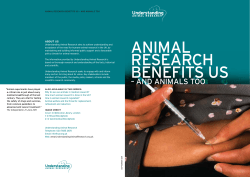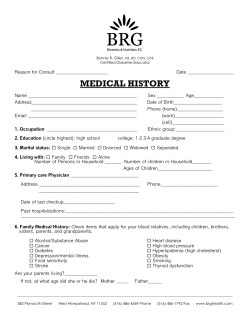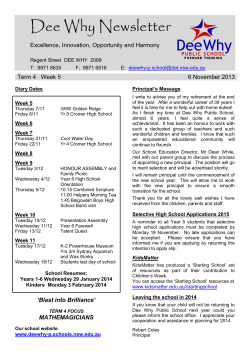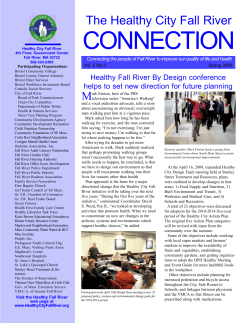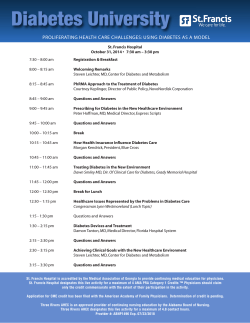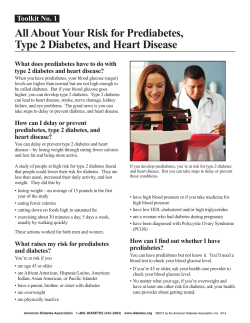
November 2014 Wellnet Calendar of Events World Diabetes Day Fair
November 2014 Wellnet | Osler 774 | Phone 410-955-7107 | Email aweber21@jhmi.edu November is Diabetes Awareness Month Monday Tuesday Wednesday 3 Fall Yoga Series Begins! Monday Classes 5:15 pm-6:15 pm Meyer 2 Gym 8 week series 4 Walking Group 11:30 am – 12:00 pm Begins at Wolfe St Entrance Every Tuesday & Friday 10 17 Knowing your numbers is the first step to reducing risk! Schedule a Short & Sweet Glucose Check today! Thursday 5 Free Cardio Jam Class 5:15 pm- 6:15 pm Meyer 2 Gym Every Wednesday Evening 11 Ying Yang Yoga Series Continues! Tuesday Classes 5:15 pm – 6:15 pm Meyer 2 Gym Series runs until 12/2 Stretch-n-Tone 12:15 pm – 1:00 pm PCTB 517 Every Monday Wellnet Calendar of Events Friday 6 Prepare for the Great American Smoke Out by requesting a Quit Kit from Wellnet. 12 11:00 am – 2:00 pm Zayed 2119A 13 18 20 Gear Up for GASO 25 26 27 Wellnet wishes you a healthy Thanksgiving! Lung Cancer Seminar‘Stop Smoking NOW!’ 21 With speaker: Peggy Lang, MSN, CRNP Zayed 2117 12:00 pm-1:00 pm 11:30 am – 1:30 pm HR Conference Room; Nelson 7 Walking Group 11:30 am – 12:00 pm Begins at Wolfe St Entrance Every Tuesday & Friday 14 Fall Zumba Series Continues! 5:30 pm – 6:30 pm Meyer 2 Gym Last Class 12/11 Stretch-n-Tone 11:45 am – 12:30 pm PCTB 517 Every Wednesday Awareness Table 11:30 am-1:30 pm Zayed 2117 7 World Diabetes Day Fair 28 Walking Group 11:30 am – 12:00 pm Begins at Wolfe St Entrance Every Tuesday & Friday November 2014 Healthy Highlights Wellnet | Osler 474 | Phone 410-955-7107 | Fax 410-955-0737 The Great American Smokeout Events Date | Friday, November 7th Gear Up for GASO- Awareness Table 2014 Tuesday, November 18th | 11:30 pm – 1:30 pm | Zayed 2117 Gear up for the Great American Smokeout by picking up a Quit Kit and educational materials during the Gear Up event scheduled for Tuesday, November 18th. Participants can sign-up on the spot for health coaching to assist them quit tobacco use. JHH/JHHS employee can complete the four sessions by January 1st and receive a $10 Target gift card! World Diabetes Day Fair The Great American Smokeout Thursday, November 20st | 11:30 am-1:30 pm | HR Conference Room, Osler 7 Celebrate the Great American Smokeout and being smoke-free by joining us at The Great American Smokeout event on Thursday, November 20th. JHH/JHHS employees that turn in a pack of cigarettes can enjoy a complimentary ten-minute seated-chair massage. You can pre-register for a time slot at the link below. Decrease Your Risk for Lung Cancer SeminarStop Smoking NOW! Friday, November 21st | 12:00 pm – 1:00 pm | Zayed 2117 With Speaker: Peggy Lang, MSN, CRNP Lung Cancer Screening/ Pulmonary Nodule Clinic coordinator Thoracic Oncology Multi-Disciplinary Program coordinator Sidney Kimmel Comprehensive Cancer Center For more information on Wellnet and services provided, visit: http://www.hopkinsmedicine.org/hu man_resources/benefits/healthy_at_ hopkins/wellnet.html Time | 11:00 am – 2:00 pm Location | Zayed 2119A & Zayed 2117 Presented by the Johns Hopkins Diabetes Center and Wellnet The fair will feature free health screenings by Wellnet, displays, and giveaways from 11 a.m. to 2 p.m. As a part of the Johns Hopkins World Diabetes Day Fair, an expert multidisciplinary panel from the Comprehensive Diabetes Center will lead an hour-long discussion on a range of diabetes-related issues at 12:00 p.m. in Zayed 2117. * Submit your question for the panel now by e-mailing cstaten2@jhmi.edu M any things affect your risk for type 2 diabetes, heart disease, and stroke. Some of these things, like your weight and how much you exercise, you can change. Other things, like your age or your family history, you can't change. But being aware of them can help you take smart steps to lower your risk. People of different racial and ethnic groups are more likely to develop type 2 diabetes, heart disease, and stroke. African Americans, Mexican Americans, American Indians, Native Hawaiians, Pacific Islanders and Asian Americans have a higher risk for these deadly diseases. This is partly because these populations are more likely to be overweight, have high blood pressure and have type 2 diabetes. Source: American Diabetes Association
© Copyright 2025

